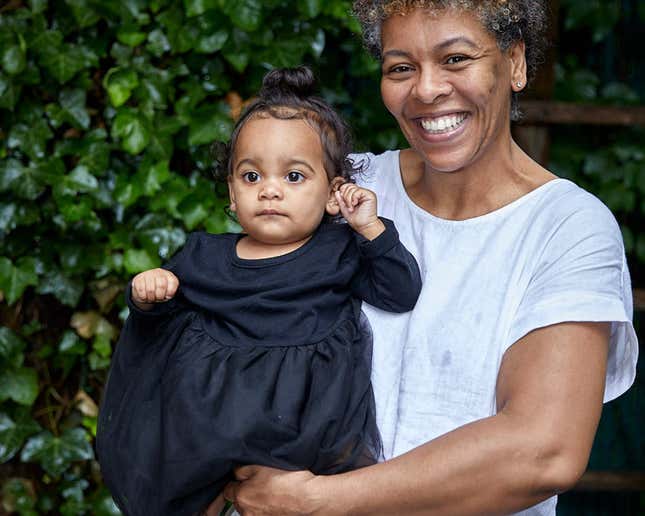
After years of fighting for her freedom, Tracy McCarter, a Black domestic violence survivor and nurse accused of murdering her alleged abuser, may soon be walking out of the courthouse doors a free woman.
In an unexpected turn of events, Manhattan District Attorney Alvin Bragg has decided to halt his office’s prosecution of McCarter. The announcement comes a week after a hotly-contested midterm election in New York, where Democrats narrowly held onto the Governorship.
For her four children, whose lives for the last two years have hinged on the outcome of one court hearing to the next, the news that their mother could be free for the holidays is an unexpected gift.
“The announcement that this is soon to be over is incredibly overwhelming,” her daughter Ashley McCarter told The Root. “Going into the holiday season, I could not be more grateful and appreciative of every single person that protested, spoke up, donated and fought for my mom.”
In a letter to the judge on this case shared with the New York Times, Bragg states that he cannot allow the case to go forward. Bragg wrote that he had “reasonable doubt of whether Ms. McCarter stabbed Mr. Murray with the requisite intent to support a conviction of murder in the second degree.”
Bragg has faced immense pressure from domestic violence, criminal justice advocates, and his own transition team, to end his office’s prosecution of McCarter, especially in light of his earlier support for her cause.
In a September, 2020, during his DA race, Bragg tweeted,“#IStandWithTracy. Prosecuting a domestic violence survivor who acted in self-defense is unjust.”
Despite his statement, Bragg continued to prosecute McCarter on murder charges after his predecessor, Cyrus Vance, left office.
The Root sat down with Bragg on Monday ahead of his office’s announcement and asked him if he stood by his earlier statement that McCarter’s prosecution was “unjust.”
“We’ve been sort of evaluating and preparing and reviewing” Bragg said. “I don’t want to say too much...but [we’re] actively engaging in the matter. And, you know, I think the team has been in touch with the defense team.”
In the interview, Bragg also referenced his office’s motion in August to get McCarter’s murder charges swapped with manslaughter charges. The motion was ultimately denied by the judge in this case, Judge Diane Kiesel, who called the it “tepid” and “vague.”
It’s been a long-road to this announcement from Bragg.
In March of 2020, McCarter was arrested in her Upper West Side Manhattan apartment after her estranged husband, James Murray, died of a stab wound during an altercation. From the beginning, McCarter and her attorneys have maintained her innocence, stating that she feared for her life and that Murray attacked her. (At the time, McCarter had moved out of their shared home and was living in the Upper West Side apartment alone).
In a transcript of body camera footage from that night obtained by The Root, McCarter tells police that Murray, who is white, had “pushed” her into glass, and that he had been “fighting” her.
Neighbors also heard the altercation. One neighbor, identified in the transcript as Will, told police that “she was trying to get him out of the house,” and then he “heard a push.” Another neighbor told the New York Post that Murray had been “very drunk, ringing all the doorbells in the apartment” and that hours later, McCarter had screamed for help.
“I heard her like screaming,“‘Oh my god, Oh my god. Somebody call 911,’” Will told the arresting officer, according to the transcript.
When police arrived, McCarter, was hunched over Murray in her scrubs trying to stop the bleeding and begging the emergency team for help. Despite her pleas that she’d acted in self-defense, police placed McCarter in handcuffs.
Allegations that Murray had been violent with McCarter and others didn’t begin that night. According to court records obtained by The Root, Murray had been arrested for assaulting his ex-wife and assaulting a police officer, both while allegedly intoxicated.
And, in text messages obtained by the Root, dating back to 2018, McCarter told friends and Murray’s family members that Murray had been violent towards her.
“I am so scared,” McCarter wrote to her friend Ashley Gray in 2018 messages obtained by The Root. “I didn’t tell you this, but he punched me and kicked me several times. And he tried to choke me.”
In a letter to Tracy as a part of his therapy for alcoholism, Murray admitted to “fighting” and “pulling Tracy’s hair.”
The grand jury that indicted McCarter on murder charges, never heard that McCarter had claimed to be afraid of Murray or her claims of self-defense.
McCarter languished in Rikers for months following her arrest in early March 20202 due to COVID-19 delays. And although she later was released on house arrest, McCarter has been barred from leaving the state to receive mental health treatment, which her medical team has argued she desperately needs to deal with the trauma of the last few years.
McCarter will still have to wait until her court hearing on November 28th to be officially released. But after months of uncertainty, McCarter’s lawyer Sean Hecker is filing what happened on Friday as a win for his client and for justice.
“I’m very grateful to DA Alvin Bragg, who has righted a grievous injustice,” wrote Hecker. “Tracy McCarter is an innocent survivor of domestic violence who has suffered mightily from a criminal justice system that demands change.”
The Root will be continuing to cover McCarter’s story and the larger issue of incarcerated survivors of domestic violence in an upcoming multi-part series.



